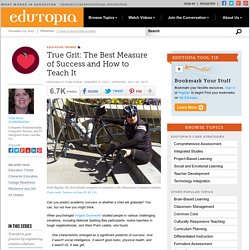

What Sir Ken Got Wrong. “We are educating people out of their creativity” Sir Ken Robinson Sir Ken Robinson’s ideas on education are not only impractical; they are undesirable.

If you’re interested in education, at some point someone will have sent you a link to a video by Sir Ken Robinson, knighted for services to education in England in 2003. He has over 250,000 followers on Twitter, his videos have had over 40,000,000 views online, and his 2006 lecture is the most viewed TED talk of all time. The RSA Opening Minds curriculum his ideas are associated with is taught in over 200 schools in the UK. Gert Biesta Asterisk TV. SOLO Taxonomy. Prezi used for NQT Network Session 8th Dec’ 2011 SOLO Taxonomy on Prezi Other SOLO Presentations.

“Authority is supposedly grounded in wisdom, but I could see from a very early age that authority was only a system of control and it didn't have any inherent wisdom. I quickly realised that you either became a. I’ve been reading a lot of Biesta recently, and thinking.

The idea of evidence-based research and linking it to current practice and policy takes its origins from the field of medicine; it has since spread to other professions such as social work, probation, clinical psychology and now, education. Evidence-based research assumes that any professional action of practitioners is an intervention. Research, sometimes through randomised controlled tests, looks for evidence on the effectiveness of these interventions.
In other words, the research finds out ‘what works’. What Schools are Really Blocking When They Block Social Media. February 2, 2012 PROJECTS: The Digital Edge TAGS: Digital Divides, Digital Media & Learning, New Media Literacies, Social Equity, Social Media.

8 (free) websites to create cool student projects online. Creating an online project is a great way to help students to demonstrate that they have learned something.

Below you will find 8 websites that offer great options for any teacher and all are free to use. The first five have screenshots of examples that I created. Fake Movie Poster Creating a movie poster is a great school project. With this simple website, the task is that much easier. Students simply upload an image, add a few details for the text and then share their completed poster with the teacher. Five-Minute Film Festival: 8 Interactive Video Tools for Engaging Learners.
Share This With All the Schools, Please. Hashtags and retweets: using Twitter to aid Community, Communication and Casual (informal) learning. Peter Reed* Centre for Excellence in Evidence-Based Learning and Teaching, Institute of Learning & Teaching, Faculty of Health & Life Sciences, University of Liverpool, Liverpool, United Kingdom (Received 18 September 2012; final version received 13 July 2013; Published: 12 September 2013) Abstract.

10 tips for creating a class agreement. Social media transforms the textbook lesson. 30 January 2014Last updated at 19:49 ET By Carolyn Rice Technology reporter, BBC News Tablets in 1946 had a very different look to those in classrooms these days Forget the blackboard and the chalk.

In fact, forget the whiteboard and the markers. The exercise books, the textbooks and the stationery can also be packed away. There is no need for any of them in the classroom of the future. The Only 2 Things You Should Be Discussing in Meetings. True Grit: The Best Measure of Success and How to Teach It. Can you predict academic success or whether a child will graduate?

You can, but not how you might think. When psychologist Angela Duckworth studied people in various challenging situations, including National Spelling Bee participants, rookie teachers in tough neighborhoods, and West Point cadets, she found: One characteristic emerged as a significant predictor of success. And it wasn't social intelligence. New Padagogy Wheel Helps You Integrate Technology Using SAMR Model.
Sometimes a visual guide comes along and it just makes total sense.

That’s how I felt about Allan Carrington’s clever ‘Padagogy Wheel‘ which we featured on Edudemic last week. Check out the previous version then view the one below to see the differences. From what I can tell, putting the wheel on this site has generated a bit of buzz and I’m glad we could help spread the knowledge. Rockit-sampler. Teachers Walk in Student Shoes For a Day. Our Thinking Has To Change. This is a bit of a rant… This morning I was pinged on a tweet sharing the article, “Why new technologies could never replace great teaching“.

For some reason, I was up early and read the article and then was WIDE AWAKE. Why new technologies could never replace great teaching. At a recent British Council debate, Is teaching obsolete? , executive headteacher Pamela Wright, called for caution around technology in teaching. Here is a transcript of her argument. I am a passionate believer in the teaching profession. Teachers do not simply impart information and knowledge; teaching is not merely about systems, facts, figures and certainly does not exist to promote insularity and lack of social interaction. If any of these elements were true, then my argument would fall down immediately.
The 8 Digital Skills Students Need for The Future. Why are so many of our teachers and schools so successful? John Hattie at TEDxNorrkoping. Why Learning Through Social Networks Is The Future. By Paul Moss, edmerger.com Students Need Professional Learning Networks, Too Learning to create, manage and promote a professional learning network (PLN) will soon become, if it’s not already, one of the most necessary and sought after skills for a global citizen, and as such, must become a prominent feature of any school curriculum. Few progressive educationalists would argue that a personal learning network (PLN) is not incredibly valuable and important. Passionate advocates including Murray, Whitby, and Sheninger lead with clarity in such discussions. The wealth of professional development that stems from such a network is quickly defining it as an essential tool for teachers, and will, I believe, replace organised costly professional development undertaken by organisations.
How a Radical New Teaching Method Could Unleash a Generation of Geniuses. In 2009, scientists from the University of Louisville and MIT's Department of Brain and Cognitive Sciences conducted a study of 48 children between the ages of 3 and 6. The kids were presented with a toy that could squeak, play notes, and reflect images, among other things. For one set of children, a researcher demonstrated a single attribute and then let them play with the toy. How Students Learn by Explaining Their Thinking. November 19, 2013 by Norene Wiesen If you want to master something, teach it.
Or so the saying goes. Secret Teacher: we can't be outstanding every day, so why judge us on that? Thinking beyond the summative assessment task. 5 Powerful Questions Teachers Can Ask Students. 5 Powerful Questions Teachers Can Ask Students. A Very Academic Problem. The Teachers vs The Greeks Teachers: Please stop using the word ‘academic’. The dumbest generation? No, Twitter is making kids smarter. Part of an occasional series about the way digital culture affects the way we think, learn and live. Brainstorming: More Questions Than Answers. The Difference Between Doing Projects Versus Learning Through Projects. The Biggest Myths (And Realities) Of Online Learning. Say What? 5 Ways to Get Students to Listen. How Young Is Too Young for an iPhone? Stop trying to figure out if screentime is good for students. Neil Gaiman: Why our future depends on libraries, reading and daydreaming.
Bringing the Kiwi classroom into the digital age - Story - Campbell Live - TV Shows. Does Gym Help Students Perform Better in All Their Classes? 4 Things To Consider Before You Flip Your Classroom. Homework. In Search Of The Benefit Of Homework - Why Paying Kids to Do Homework Can Backfire. When Homework is a Waste of Time. Learning styles. Zella said purple: called to teach, called to play. Russell Poldrack: Are "Learning Styles" Important In Teaching Methods? Why The Brain Benefits From Reflection In Learning. A Powerful App For Every Level Of Bloom's Taxonomy. 4 Visual Guides To Bloom's Taxonomy Apps. Terrific Tools for Teaching with Bloom's Taxonomy - Home. A Juicy Collection of Bloom's Digital Taxonomies! What inner city kids know about social media, and why we should listen — I.M.H.O.
Creativity unleashed! 22 Ways To Use Twitter For Learning Based On Bloom's Taxonomy. Diane Ravitch and learning technologies: Here we go again. Does the education industrial complex want teaching to be a trade or a profession? A back to basics thought experiment about blended learning. ECSDTransform on USTREAM: . Autres éducatifs.
Schools' test-focus queried. The Myth of Multitasking. 7 ways to support learner-teacher interaction. How To Make Students Better Online Researchers. What the Future of Learning Might Look Like. Steps Into 21st Century Classroom. Is It Time to Get Rid of Desks in the Classroom? “So, What’s Your Book All About?” The Chilean muralists who defied Pinochet. Steve Brown. 5 Critical Mistakes Schools Make With iPads (And How To Correct Them)